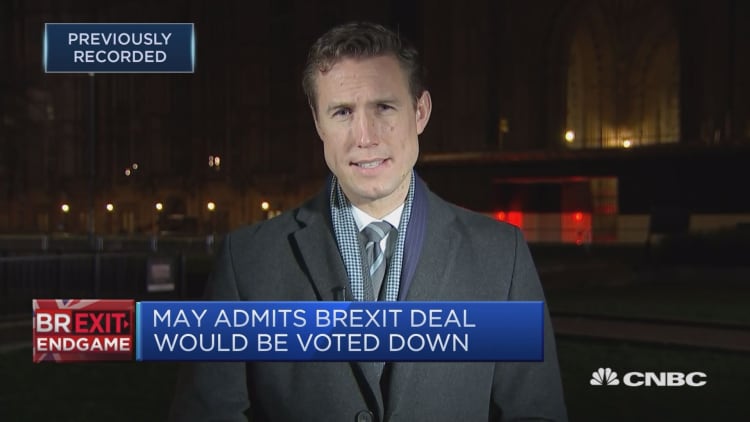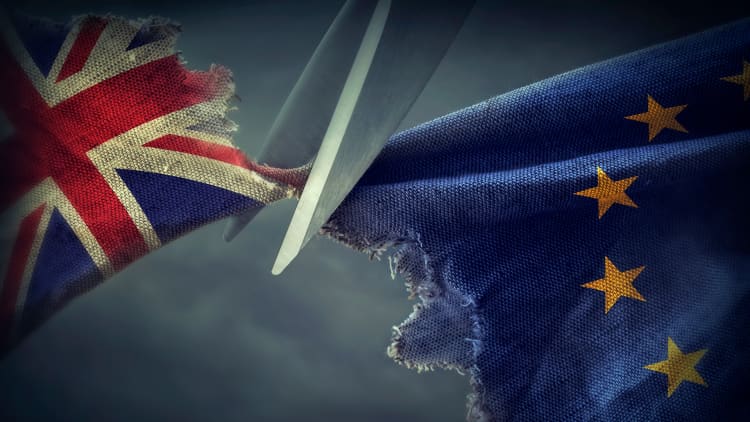Now that the U.K.'s vote on Brexit deal has been delayed, the unwieldy Brexit process is looking as unpredictable and chaotic as ever with British Prime Minister Theresa May having to go back to Europe for changes to the withdrawal agreement.
Whether those will be granted, and whether the U.K.'s parliament will agree to any new changes in a rescheduled parliamentary vote that has to take place before January 21, 2019, is uncertain.
On Monday, May announced that she was delaying a key Brexit vote in the U.K.'s parliament on Tuesday, prompting sterling to fall to a 20-month low and uproar among Britain's political establishment.
The delay of the parliamentary vote (a so-called "meaningful vote" that would allow MPs to either voice their support, or not, of the withdrawal agreement) came after a tide of opposition to the deal that she had struck with Brussels. Against this backdrop, May is going back to Europe to try to get the withdrawal agreement amended.
Whether her European counterparts will budge is being closely watched. Whatever happens this week — and at a future parliamentary vote on any amended withdrawal agreement — could make or break Brexit, and the prime minister.
The 'backstop'
The main reason that Theresa May pulled the plug on Tuesday's vote, and the main reason for continuing strong opposition among members of the British parliament (MPs) to the withdrawal agreement May struck with Europe, is because of the Irish/Northern Irish border.
In order to prevent a hard border if the U.K. and EU can't strike a trade deal in the 21-month transition period (that could be extended) after Brexit in March 2019, a "backstop" could be implemented that keeps Northern Ireland broadly aligned to EU rules, thus allowing the free movement of goods and people to continue as before.
In essence, a "backstop" is aimed at preventing a 'hard' border between Ireland and Northern Ireland.
The backstop is extremely controversial, however, because of its indefinite nature and because it would mean that Northern Ireland (which is a part of the U.K.) has a different relationship with the EU than the rest of the U.K.

Addressing parliament on Monday, May claimed that while there was broad support for her deal, the issue of the Northern Irish backstop still prompted "widespread and deep concern" and she would return to European counterparts to renegotiate the deal.
MPs of all persuasions slammed her decision to go back to Brussels and are skeptical that she can secure any more concessions from European negotiators. In particular, May said she would seek assurances from the EU that the backstop would prove temporary if it ever came into force.
Charm offensive
Irish Prime Minister Leo Varadkar and the head of the European Council, Donald Tusk, have already repeated a well-known mantra from Brussels that the withdrawal agreement is not negotiable and that it is the best deal the U.K. is going to get.
European Commission President Jean-Claude Juncker said Tuesday morning that there is "no room whatsoever left for Brexit deal negotiation," he is also due to meet May Tuesday evening.
For her part, May will meet the leaders of Germany and the Netherlands on Tuesday in the hope that they can help her to get the deal amended. She will also meet Tusk on Tuesday afternoon.
These meetings come ahead of a European Council meeting scheduled for Thursday where Brexit – and the backstop – will be discussed.

"Additional language on the future relationship (and how it is intended to make the Northern Irish backstop unnecessary) is possible and in fact quite likely," Carsten Nickel, deputy director of research at Teneo Intelligence, said in a note Monday evening.
"Yet this will do little to overcome the structural issue: the legally binding nature of the backstop in the withdrawal agreement, in contrast to the merely political character of any additional declaration. This is, in turn, is unlikely to reassure hardcore Brexiters."
Does fear of no deal help the deal?
Analysts now expect a "meaningful vote" on any amended deal to be held in the new year, pushing the vote closer to the withdrawal date on March 29, 2019. It has been noted, however, that the U.K. should submit its official position on the Brexit deal (that it, after a vote in the House) by January 21, 2019.
This will then be put for a vote to the EU parliament in early March 2019. Three weeks later, the U.K should be leaving the EU.
As such, a rejection of any amended deal in the new year leaves little time for any other type of withdrawal agreement. Crucially, it raises the prospect of a "no-deal" departure which is seen as the worst possible scenario for the U.K. as it puts economy in unchartered territory.
Nicky Morgan, a Conservative MP that had intended to vote for the deal despite it being "imperfect," told CNBC Tuesday that "the more time we spend arguing over this, that and the other, the less time there is to put a deal in front of parliament that gets approved, so the closer we are to sliding out of the EU with no deal."

Speaking to CNBC's Willem Marx, Morgan said that "every day that goes past, a no-deal becomes more likely …the longer this is left the more likely it is that we head for a very damaging no deal Brexit which will not help everybody."
The danger of a no-deal could ultimately help May's deal get through the House of Commons (the lower house of parliament) as most MPs try to avoid this scenario.
"It remains to be seen whether any potential changes would help sell May's deal," Valentin Marinov, Head of G10 FX Research at Credit Agricole, said Monday.
"That said, the future meaningful vote would take place very close to the Brexit's deadline and any rejection would add to the risk of an accidental 'no deal' Brexit. This much may ultimately sway the vote in favour of May's deal."
Weak power
In the meantime, May's hold on power looks to be hanging by a thread – although whether the departure of the prime minister is desirable at such a crucial moment in Brexit negotiations (that could happen if there was a vote of no confidence in the prime minister) is also at the forefront of MPs minds.
On Tuesday, MPs are going to hold an emergency debate on the decision to delay the Brexit vote. The opposition Labour party is reportedly considering putting forward a vote of no confidence vote in May.
Even members of her own party who were previous supporters of May are skeptical about her leadership now. Prominent Brexiteer Jacob Rees-Mogg said in a statement Monday that "this is not governing, it risks putting (opposition Labour leader) Jeremy Corbyn into government by failing to deliver Brexit. We cannot continue like this. The Prime Minister must either govern or quit."
MP Nicky Morgan told CNBC that "the issue for the country is would it be right to have a leadership contest at this moment in time and the answer cannot possibly be 'yes' … ultimately as a parliament we need to work out how we are going to get a deal that is going to carry us over the period of leaving the EU."


